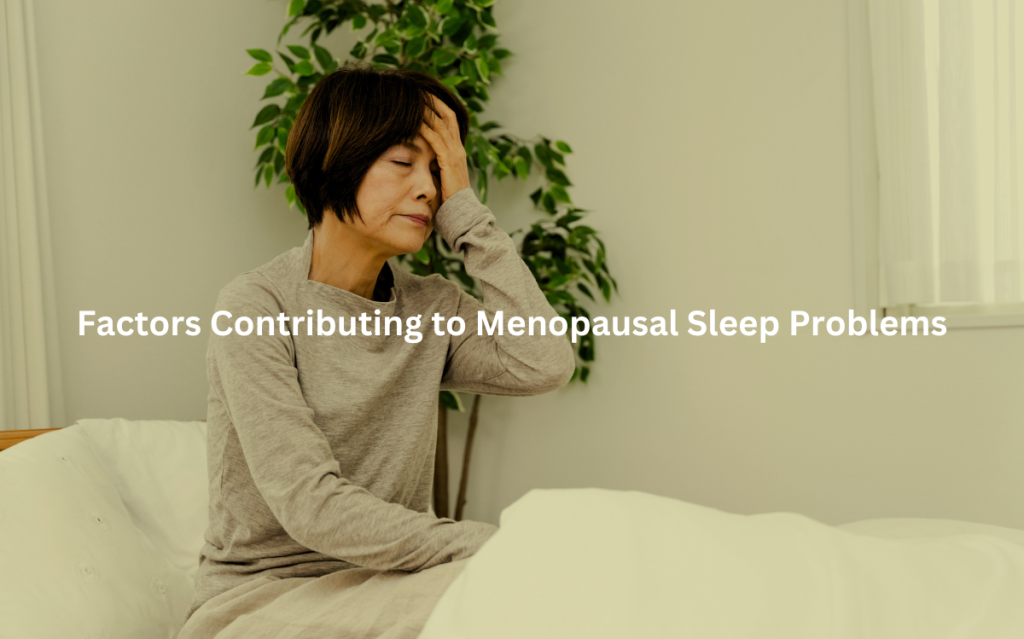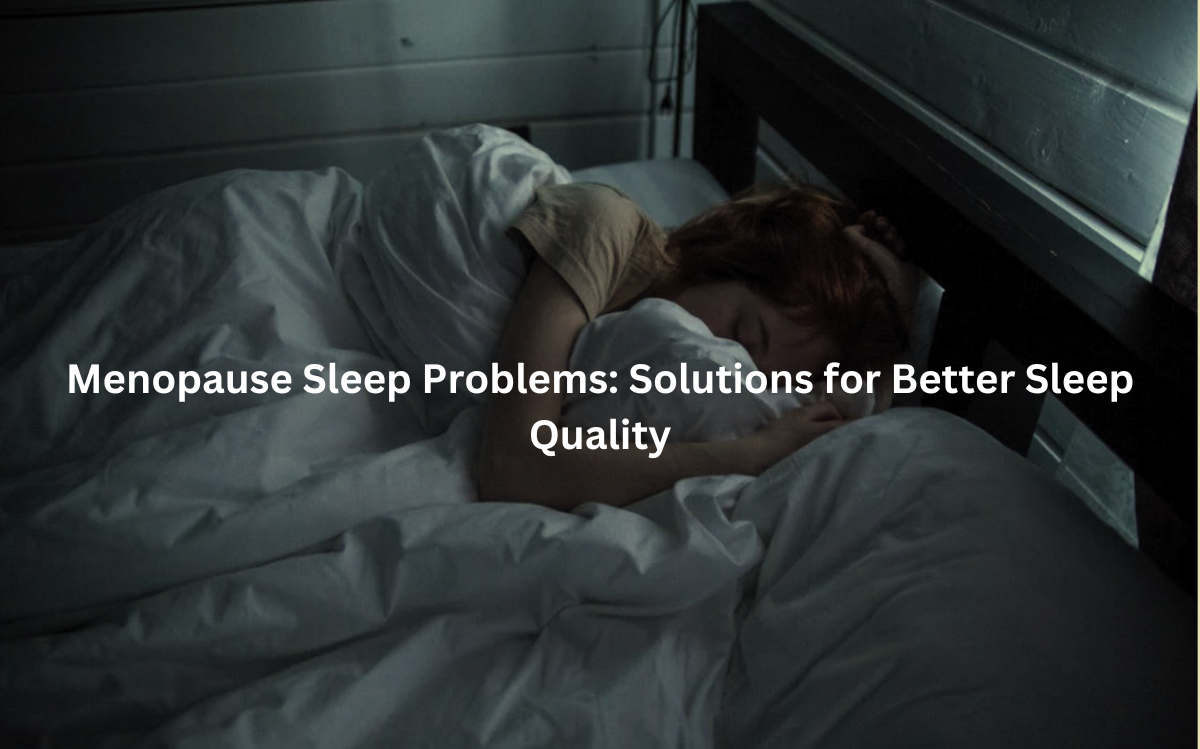Struggling with menopause sleep problems? Learn how to improve your sleep quality and regain control.
Menopause brings with it a host of sleep issues, from hot flashes to sleep apnea, affecting women’s health and quality of life. (1)
Hormonal changes can disrupt the body’s natural sleep-wake cycle, leading to restless nights and fatigue. While these disturbances can feel overwhelming, there are ways to manage and improve sleep quality during this transition.
Key Takeaways
- Hormone therapy can significantly reduce sleep disturbances by stabilizing hormone levels.
- Non-hormonal treatments like Cognitive Behavioral Therapy for Insomnia (CBT-I) can be effective for improving sleep quality.
- Lifestyle changes, including stress management and better sleep hygiene, play a key role in managing menopause-related sleep issues.
Understanding Menopause and Sleep Issues
Menopause. It’s a stage that no woman can escape, and it’s as natural as aging itself. But with this change comes an onslaught of new challenges, and sleep problems are among the most common. Hot flashes, night sweats, and sleep apnea can make it feel like you’re battling your own body each night.
As estrogen levels drop, the delicate balance of hormones that regulate your sleep cycle starts to crumble, causing havoc with your body’s internal clock. It’s not just about getting less sleep — it’s about getting worse sleep, too. Poor sleep impacts mood, memory, and overall health, making it a particularly tough challenge during menopause. (2)
For many women, sleep problems are a constant reminder of this transitional period. It’s as though sleep becomes a distant memory, and even when you do manage to get some rest, it never feels like enough.
Menopause and sleep disturbances go hand in hand, and unfortunately, it’s one of the least discussed, yet most widespread, effects.
Common Sleep Disorders in Menopausal Women
Among the many sleep disturbances that crop up during menopause, insomnia is one of the most common. It’s not just about tossing and turning; it’s about lying awake, wondering if sleep will ever come. Insomnia often includes:
- Waking up frequently during the night.
- Waking up too early and being unable to fall back asleep.
Sleep apnea is a bit more serious. It occurs when breathing is interrupted during sleep, often without the person even realising it. Women in menopause are more likely to develop this condition due to hormonal shifts. Sleep apnea can result in:
- Restless nights and poor sleep quality.
- Increased fatigue and irritability.
- Higher risk of cardiovascular issues.
Restless legs syndrome (RLS) is another condition that disrupts sleep. For some, it’s an irresistible urge to move their legs at night, making it nearly impossible to get restful sleep. This condition can worsen during menopause, adding to the existing sleep challenges.
Cognitive disturbances such as brain fog, memory lapses, and concentration difficulties also arise as a result of poor sleep. Hormonal changes during menopause affect brain chemistry, which can lead to:
Worsened cognitive function, especially when sleep is disrupted.
Mental clarity issues.
Factors Contributing to Menopausal Sleep Problems

So why is it that menopause causes such a mess of sleep issues? The key player here is hormonal fluctuations. The drop in estrogen can directly affect the sleep-wake cycle. Estrogen, as it turns out, plays a role in regulating sleep. When its levels start to decline, things get out of whack.
One of the major symptoms of menopause — hot flashes — is another culprit. These sudden bursts of heat can strike in the middle of the night, waking you from a deep sleep.
Night sweats make things worse, leaving you drenched and uncomfortable. These symptoms often disrupt sleep cycles, making it harder to stay asleep for long periods.
In addition to physical symptoms, menopause often brings emotional challenges. Depression, anxiety, and stress can lead to restless nights. This isn’t a coincidence.
The hormonal fluctuations of menopause can worsen mood disorders, creating a snowball effect where poor sleep makes you more susceptible to emotional distress, which, in turn, worsens sleep.
How Hormone Therapy Can Improve Sleep Quality
Hormone Replacement Therapy (HRT) has long been the go-to solution for managing the effects of menopause. The primary benefit of HRT is its ability to stabilize hormone levels, including estrogen, which helps regulate sleep. For many women, it can be a game changer when it comes to managing sleep disturbances.
There are different types of hormone therapy available. Oral forms of HRT are widely used, but some women find that transdermal options, such as patches or gels, work better for them.
These methods deliver hormones directly into the bloodstream, bypassing the digestive system, which can sometimes reduce side effects.
For women who have cardiovascular risks or other health conditions, it’s important to work closely with a healthcare provider to determine the best type of HRT. While HRT can be incredibly helpful, it’s not suitable for everyone, and individual health conditions need to be carefully considered.
Alternative Treatments for Sleep Issues During Menopause
If HRT isn’t the right fit or if alternative treatments are being considered, several options are available:
- Cognitive Behavioral Therapy for Insomnia (CBT-I): This non-pharmaceutical approach helps women identify and change behaviours and thought patterns that prevent restful sleep. It’s proven to be effective, and many women find it a valuable addition to their sleep management toolkit.
- Pharmaceutical Options: For those needing medication but avoiding hormones, drugs like SSRIs (Selective Serotonin Reuptake Inhibitors), SNRIs (Serotonin-Norepinephrine Reuptake Inhibitors), and gabapentin may be helpful. Though not typically prescribed specifically for sleep, these medications can relieve symptoms such as anxiety and hot flashes, which can interfere with rest.
- Lifestyle Changes: Regular exercise, a balanced diet, and stress management techniques like yoga or meditation are essential for better sleep. A holistic approach that focuses on both mind and body can contribute to lasting improvements in sleep quality.
Managing Hot Flashes and Night Sweats to Improve Sleep
Managing hot flashes and night sweats is crucial for improving sleep during menopause. The most effective way to deal with them might involve a combination of cooling products and environmental adjustments. Some women find relief from cooling pillows or sleepwear designed to wick away moisture and regulate temperature.
Room temperature control is another useful tactic. Keep your bedroom cool, ideally around 65°F (18°C). This can help reduce the frequency and intensity of hot flashes and night sweats, ensuring you stay comfortable through the night.
Hydration plays a role too. Drinking enough water throughout the day can help prevent overheating at night. Avoid caffeinated beverages in the evening, as they can make you feel warmer and interfere with sleep.
Impact of Sleep Problems on Mental Health During Menopause
Sleep deprivation doesn’t just impact physical health; it can also take a toll on mental well-being. During menopause, mood swings, depression, and anxiety are common, and poor sleep can worsen these symptoms. The cycle is difficult to break: the more women struggle with sleep, the more stressed or anxious they become, and the more stress interferes with their ability to rest.
- Cognitive Decline: Chronic insomnia can lead to cognitive issues. Studies have shown that long-term sleep deprivation can impair memory and concentration, potentially increasing the risk of Alzheimer’s and other cognitive problems.
This makes it crucial to address sleep disturbances as part of a larger strategy for mental well-being during menopause.
- Mental Health Support: Fortunately, support options are available. Therapy, whether through counselling, cognitive behavioural techniques, or support groups, can help women cope with the emotional side of menopause. Practices like meditation and mindfulness can also be beneficial for managing stress and improving sleep quality.
Seeking Professional Help for Menopausal Sleep Disorders
It’s important to know when to seek professional help for sleep problems. If menopause-related sleep disturbances become persistent, a healthcare provider should be consulted.
There are a range of treatments available, from hormone-based therapies to medications and behavioral therapies, and a professional can help navigate these options.
Health Canada and menopause specialists are key resources in managing menopausal symptoms. A sleep study might even be recommended if sleep apnea or other serious conditions are suspected. It’s crucial to find a treatment plan that’s individualized, taking into account a woman’s overall health, medical history, and preferences.
Conclusion
Menopause can bring a variety of sleep challenges, but it’s important to remember that there are options available to help manage these symptoms. Hormone therapy, lifestyle changes, and mental health support are all part of a multifaceted approach to better sleep.
If you’re struggling with sleep during menopause, start by identifying the specific symptoms that are keeping you up at night. Whether it’s hot flashes, insomnia, or something else, knowing what’s at the root of your sleep troubles can help guide your treatment.
Working closely with a healthcare provider can help you find the right combination of therapies and lifestyle changes to improve your quality of sleep — and ultimately, your overall well-being.
Don’t let sleep disturbances during menopause affect your life. Book a consultation with Modern Menopause today and start addressing your symptoms with expert support and care.
FAQ
What are common sleep issues during menopause?
Menopause often disrupts sleep due to fluctuating hormone levels. Hot flashes, night sweats, and anxiety can lead to frequent awakenings, making it difficult to stay asleep. A drop in estrogen affects brain function, making it harder to maintain a deep, restful sleep. Lifestyle changes, stress management, and sometimes hormone replacement therapy (HRT) can help improve sleep quality for many women.
How does menopause affect sleep quality?
During menopause, a decrease in estrogen and progesterone can interfere with the body’s ability to regulate sleep. This can lead to insomnia, waking up in the middle of the night, and difficulty falling back asleep. Hot flashes, mood changes, and night sweats often worsen sleep disturbances, significantly impacting overall well-being.
Can HRT help with sleep problems during menopause?
Hormone Replacement Therapy (HRT) can alleviate menopause symptoms, including sleep disturbances. Estrogen helps regulate body temperature, reducing night sweats and hot flashes, which can disrupt sleep. Progesterone, often used alongside estrogen in HRT, has a calming effect, potentially improving sleep. However, it’s essential to discuss the benefits and risks with a healthcare provider.
What are non-hormonal treatments for menopause-related sleep issues?
For women who cannot or prefer not to use HRT, several non-hormonal treatments may help. Cognitive Behavioral Therapy for Insomnia (CBT-I) is effective in managing sleep disturbances. Other options include medications like melatonin or certain antidepressants (SSRIs or SNRIs) that can ease anxiety and improve sleep, though their use should be carefully considered by a doctor.
How can lifestyle changes improve sleep during menopause?
Making lifestyle changes can significantly improve sleep quality during menopause. Regular physical activity, such as walking or yoga, helps reduce hot flashes and promotes better sleep. A balanced diet, reduced caffeine and alcohol intake, and creating a relaxing bedtime routine also help. Practicing relaxation techniques like deep breathing or meditation can reduce stress and improve sleep.
References
- https://www.nia.nih.gov/health/menopause/sleep-problems-and-menopause-what-can-i-do
- https://www.womens-health-concern.org/wp-content/uploads/2022/12/17-WHC-FACTSHEET-Menopause-and-insomnia-NOV2022-B.pdf

Leave a Reply